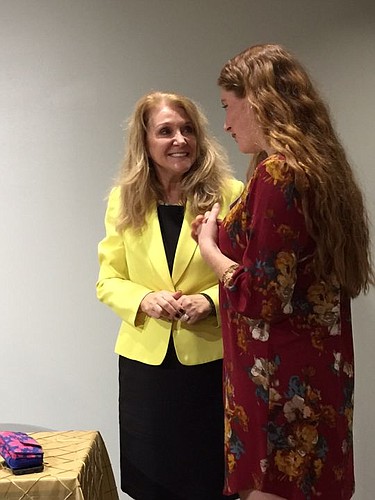
“Feeling Fine,” the second in the Jacksonville University Women’s Breakfast Series for 2016-17, focused on health.
The series honors the upcoming 100th birthday of Chancellor Emerita Frances Bartlett Kinne, “who exemplifies good health,” said the invitation.
Kym Seavey Dunton and Heather Hausenblas comprised the panel that met Friday morning at the Jessie Ball duPont Center Downtown.
Dunton, a registered nurse, is the senior consultant and certified health coach for the Women’s Health Strategy at Baptist Health.
Hausenblas is a professor in the Department of Kinesiology at the School of Applied Health Sciences in the JU Brooks Rehabilitation College of Healthcare Sciences.
The hourlong discussion covered workplace wellness, exercise and other topics. Among the advice:
Get those 10,000 steps a day
It’s not as difficult as you might think to accumulate steps.
Talk with a co-worker in person rather than by email, necessitating a walk. Use a printer in another room or another building. Set your phone across your room. Park further from the door. Take the stairs instead of the elevator.
Plus, 10,000 steps are actually a minimum. It takes more to lose weight.
Dunton said trackers show the average American takes about 5,000 steps a day.
Get up and move at least once an hour if you have a desk job.
“How about little movements like every hour trying to throw in 250 steps? It doesn’t take very long but that gets you up and moving,” she said.
Along with taking more steps, Dunton and Hausenblas suggest other ways to boost activity: Use a standing desk. Stand while you talk on the phone. Even use a manual toothbrush instead of an electric one.
“We have to be moving,” Dunton said.
Prioritize exercise
Find the best time to exercise every day and stick to it so it becomes a habit. Time of day doesn’t matter.
“What’s important is that you get it in during the day and that you’re consistent with it,” Hausenblas said.
Plug it into your planner if that helps.
Dunton said that in addition to walking, the pool also is good for a workout.
The best exercise, Dunton said, “is the one you’ll do.”
Eat what works
Instead of following the latest trend or fad, focus on a rainbow diet heavy with produce. More color on the plate means a better food balance.
“If you look at your plate, you want to see … brightly colored, largely fruits and vegetables,” Hausenblas said. That probably means you’re consuming the needed vitamins and minerals.
Hausenblas said the term “superfood” is a marketing term. “Scientists don’t use that word, she said.
Also, don’t force consumption. “If you don’t like something, don’t eat it,” she said, like kale or Brussels sprouts.
However, Dunton found a secret to kale: Massage it with a little oil to take away bitterness. It’s now one of her favorite foods, although it’s not a taste shared by her family.
Asked about a gluten-free diet, Dunton said people diagnosed with celiac disease must avoid gluten. “If there’s not a medical reason, just because it’s gluten-free doesn’t mean it’s healthy,” she said.
Dunton said she teaches people to slow down as they eat and note how their bodies feel. She said people can remove gluten, dairy and bread from their diets, “and see how you feel.”
Both said that choosing a supplement requires homework. Some are good but others are “what you pay for is what you get,” Hausenblas said.
Fasting and chewing
It’s not just what you eat. It’s also when you eat.
Hausenblas described the benefit of intermittent fasting, such as consuming all your daily calories during an eight-hour period.
To do that, for example, you can eat during the day but fast after dinner until lunch the next day. “It’s easier to do than you think,” she said.
Hausenblas said there are health benefits to intermittent fasting, “not only weight loss but you’re going to feel better.”
“It’s not restricting what you eat. It’s just restricting when you eat it,” she said.
She said it is so successful that pharmaceutical and supplement companies are trying to develop its benefits in a capsule form.
Dunton adds “chain chewing” to eating practices to avoid. That’s when you don’t finish chewing your food before you take another bite.
“We’re just so hungry we’re just wolfing it down,” she said.
“You may say, ‘that’s not a big deal, that’s not very much.’ This adds up,” she said.
Live in the present
Mindfulness means paying attention to the here and now.
“We’re always worrying about the next thing, or we’re waiting to retire, or we’re waiting for a vacation, or we’re thinking about the past — and we’re missing the moment,” Dunton said.
Dunton recommends people avoid distractions.
“A simple thing to do is to unplug,” Hausenblas said.
That means to loosen the ties to phones and devices.
“It’s very clear the more time we spend time on our phone and on social media, the less productive we are, the less happy we are, the less fit we are,” she said.
Hausenblas suggests quitting social media for one day a week. “You’re not going to miss out on much, maybe what your friend cooked for dinner.”
Over time, she said, you’ll notice a difference.
Drink your water
When it comes to thirst, listen to your body. That sounds simple, but there are advocates for drinking specific amounts of fluids in certain time periods.
It doesn’t need to be complicated.
“When your body has to go to the bathroom, that’s what you do. The same thing with thirst. When your body tells you you’re thirsty, then it’s time to drink,” Hausenblas said.
And her drink of choice is not only water, but tap water.
Dunton added another benefit to water — cutting back on over-eating. Sometimes hunger actually is thirst.
@MathisKb
(904) 356-2466